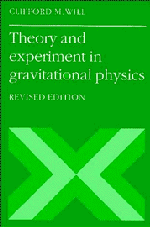Book contents
- Frontmatter
- Contents
- Preface to Revised Edition
- Preface to First Edition
- 1 Introduction
- 2 The Einstein Equivalence Principle and the Foundations of Gravitation Theory
- 3 Gravitation as a Geometric Phenomenon
- 4 The Parametrized Post-Newtonian Formalism
- 5 Post-Newtonian Limits of Alternative Metric Theories of Gravity
- 6 Equations of Motion in the PPN Formalism
- 7 The Classical Tests
- 8 Tests of the Strong Equivalence Principle
- 9 Other Tests of Post-Newtonian Gravity
- 10 Gravitational Radiation as a Tool for Testing Relativistic Gravity
- 11 Structure and Motion of Compact Objects in Alternative Theories of Gravity
- 12 The Binary Pulsar
- 13 Cosmological Tests
- 14 An Update
- References
- References to Chapter 14
- Index
13 - Cosmological Tests
Published online by Cambridge University Press: 04 April 2011
- Frontmatter
- Contents
- Preface to Revised Edition
- Preface to First Edition
- 1 Introduction
- 2 The Einstein Equivalence Principle and the Foundations of Gravitation Theory
- 3 Gravitation as a Geometric Phenomenon
- 4 The Parametrized Post-Newtonian Formalism
- 5 Post-Newtonian Limits of Alternative Metric Theories of Gravity
- 6 Equations of Motion in the PPN Formalism
- 7 The Classical Tests
- 8 Tests of the Strong Equivalence Principle
- 9 Other Tests of Post-Newtonian Gravity
- 10 Gravitational Radiation as a Tool for Testing Relativistic Gravity
- 11 Structure and Motion of Compact Objects in Alternative Theories of Gravity
- 12 The Binary Pulsar
- 13 Cosmological Tests
- 14 An Update
- References
- References to Chapter 14
- Index
Summary
Since the discovery by Hubble and Slipher in the 1920s of the recession of distant galaxies and the inferred expansion of the universe, cosmology has been a testing ground for gravitational theory. That discovery was thought at the time to be a great confirmation of general relativity for two reasons. First, general relativity, in its original form, predicted a dynamical universe that necessarily either expands or contracts. Of course, Einstein had later modified the theory by introducing the “cosmological constant” into the field equations in order to obtain static cosmological solutions in accord with the current, pre-Hubble observations. To his great joy, following Hubble's discovery, Einstein was allowed to drop the cosmological constant.
Second, was simply the fact that general relativity was capable of dealing with the structure and evolution of the universe as a whole, a capability not shared by Newtonian theory (unless special assumptions are made). However, this capability is more a consequence of the Einstein Equivalence Principle (alternatively of the metric-theory postulates) than a property of general relativity. Because of EEP, spacetime is endowed with a metric g which determines the results of observations made using nongravitational equipment (light rays, telescopes, spectrometers, etc.) and the motion of test bodies (galaxies). Via the field equations provided by each metric theory of gravity, the distribution of matter then determines the metric g, and thereby the entire physical spacetime in which observations are made.
Information
- Type
- Chapter
- Information
- Theory and Experiment in Gravitational Physics , pp. 310 - 319Publisher: Cambridge University PressPrint publication year: 1993
